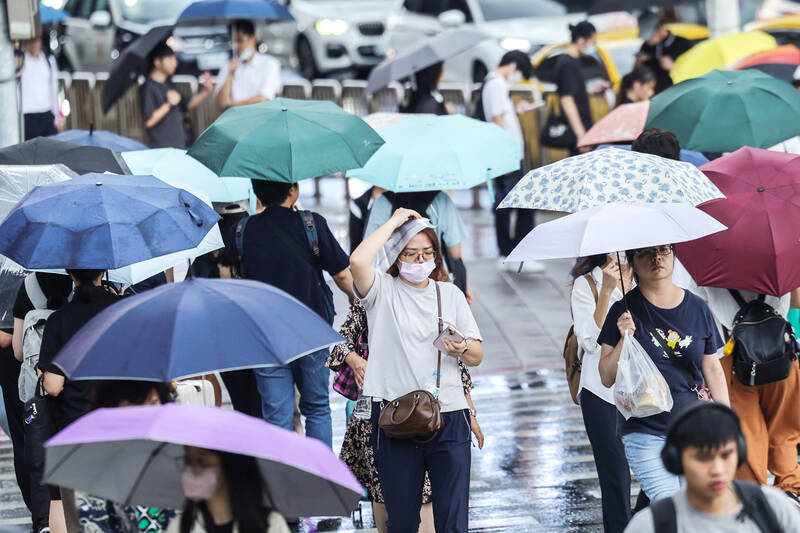Average regular monthly wages in the industrial and service sectors rose 2.99 percent year-on-year in the first half of this year to NT$47,608 (US$1,591), the fastest pace for the period since 2001, fueled by minimum wage hikes and broad-based pay increases across industries, the Directorate-General of Budget, Accounting and Statistics (DGBAS) said yesterday.
In real terms, regular wages increased 1.04 percent, the strongest in five years, while total inflation-adjusted compensation rose 1.52 percent, a four-year high, the agency said.
“The growth reflects higher base pay, modest inflation and steady labor demand in key industries,” Census Department Deputy Director Tan Wen-ling (譚文玲) said.

Photo: CNA
However, the headline figures mask a widening gap between top earners and the majority of workers.
Nearly 70 percent of the workforce earned less than the statistical average in the first half of the year, up from two-thirds in 2020, suggesting wage gains have been concentrated at the upper end of the pay scale.
The median monthly wage — considered a more accurate gauge of typical earnings — rose 2.81 percent to NT$38,000 in the first half, a slower increase than a year earlier.
“The figures show a right-skewed distribution, with a relatively small group of high-income earners lifting the average,” Tan said.
While the data alone do not prove worsening inequality, the trend is “concerning and warrants further study,” she said.
Economists have warned that without broader wage growth, structural income gaps could weigh on household consumption and deepen social divisions, despite record-high headline gains.
By sector, financial and insurance companies posted the highest average pay at NT$70,691, followed by publishing, audiovisual and information services at NT$69,366, the DGBAS data showed.
At the bottom, workers in accommodation and food services earned NT$35,001 on average, while those in personal services — including beauty and hairdressing — took home NT$36,573 on average, the data showed.
The labor market remained resilient in June, supported by strong export demand and steady domestic consumption. The number of salaried employees reached 8.5 million, up 3,000 from May and 68,000 from a year earlier, the DGBAS said.
Average total working hours were 173.3, including 8.6 hours of overtime.
In the electronic components manufacturing sector — a bellwether for Taiwan’s export-oriented economy — overtime surged to 27.9 hours, the highest in 45 years and the 24th straight month of year-on-year growth, underscoring unrelenting demand for semiconductors and components for artificial intelligence and high-performance computing.
Hiring momentum was strongest in accommodation and food services, as well as healthcare and social work, partly due to high turnover, while employment declined in arts, entertainment and other service industries, the DGBAS said.

On Tuesday, US President Donald Trump weighed in on a pressing national issue: The rebranding of a restaurant chain. Last week, Cracker Barrel, a Tennessee company whose nationwide locations lean heavily on a cozy, old-timey aesthetic — “rocking chairs on the porch, a warm fire in the hearth, peg games on the table” — announced it was updating its logo. Uncle Herschel, the man who once appeared next to the letters with a barrel, was gone. It sparked ire on the right, with Donald Trump Jr leading a charge against the rebranding: “WTF is wrong with Cracker Barrel?!” Later, Trump Sr weighed

SinoPac Financial Holdings Co (永豐金控) is weighing whether to add a life insurance business to its portfolio, but would tread cautiously after completing three acquisitions in quick succession, president Stanley Chu (朱士廷) said yesterday. “We are carefully considering whether life insurance should play a role in SinoPac’s business map,” Chu told reporters ahead of an earnings conference. “Our priority is to ensure the success of the deals we have already made, even though we are tracking some possible targets.” Local media have reported that Mercuries Life Insurance Co (三商美邦人壽), which is seeking buyers amid financial strains, has invited three financial

OUTLOOK: Among the six sub-indices, only the stock market confidence sub-index rose due to strong equity performance and expectations of a US Federal Reserve rate cut Consumer confidence weakened further this month, sliding to its lowest level in two-and-a-half years as households grew increasingly uneasy about the economic outlook, job security and big-ticket spending, a survey by the National Central University showed yesterday. The consumer confidence index fell 1.07 points from last month to 63.31, the weakest number since May 2023, said the university’s Research Center for Taiwan Economic Development (RCTED), which conducts the monthly poll. “Although the Directorate-General of Budget, Accounting and Statistics recently increased Taiwan’s GDP growth forecast for this year to 4.45 percent, consumer sentiment tells a different story,” RCTED director Dachrahn Wu

Artificial intelligence (AI) chip designer Cambricon Technologies Corp (寒武紀科技) plunged almost 9 percent after warning investors about a doubling in its share price over just a month, a record gain that helped fuel a US$1 trillion Chinese market rally. Cambricon triggered the selloff with a Thursday filing in which it dispelled talk about nonexistent products in the pipeline, reminded investors it labors under US sanctions, and stressed the difficulties of ascending the technology ladder. The Shanghai-listed company’s stock dived by the most since April in early yesterday trading, while the market stood largely unchanged. The litany of warnings underscores growing scrutiny of